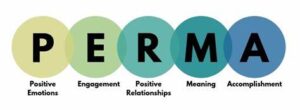The Secret to Happiness? Science Says It’s Strong Relationships
What if the secret to health, happiness, and living longer had nothing to do with superfoods, exercise plans, or the latest self-help books? What if the answer was right in front of us all along – our relationships?
Decades of compelling research, including the influential PERMA model of wellbeing, reveals close social connections are one of the five essential pillars for satisfaction and flourishing in life. The other elements are Positive Emotion, Engagement, Meaning, and Accomplishment.
Neuroscience confirms our brains are wired for human bonds. Actively cultivating high-quality relationships may just be the closest thing we have to a “happiness hack.”
The Power of Social Connection
Both common wisdom and scientific evidence confirm humans are inherently social creatures. We yearn for belonging, intimacy, and mutual support. A 2015 study shows loneliness takes a devastating toll on mental and physical health. Isolation is as damaging as smoking 15 cigarettes a day.
Conversely, close relationships provide a buffer against stress and depression. People immersed in positive social connections live up to 22% longer on average, according to a 2010 meta-analysis published in PLOS Medicine encompassing 148 different studies. Other research reveals your chances of thriving increase by 50% through social relationships.
It seems theologian and author Thomas Merton was onto something when he wrote, “We are already one. But we imagine that we are not. And what we have to recover is our original unity.” Reclaiming fulfilling bonds may be key to unlocking health.
The Good, Bad, and Ugly of Relationships
Of course, not all relationships are created equal when it comes to wellbeing. While high-quality connections uplift us, toxic bonds can become a tremendous source of pain and frustration.
According to relationship researcher Dr. Sandra Murray, relationships can be categorized into supportive and unsupportive types. Supportive relationships are marked by care, validation, and encouragement which fosters growth. Unsupportive ones involve hostility, neglect, and conflict which obstruct thriving.
So what sets healthy relationships apart? Leading experts point to several key characteristics:
Trust – Being able to rely on the other person and feel emotionally safe, even during conflict. Having faith they have your best interests in mind.
“In successful long-term relationships, we develop attachment trust,” says relationship psychologist Dr. John Gottman, author of The Relationship Cure: A 5 Step Guide to Strengthening Your Marriage, Family, and Friendships. “We feel our partner cares about us, has our back, and supports us unconditionally.” While Gottman’s primary work is with romantic relationships, these features are also important in our friendships and work relationships.
Empathy – The ability to understand each other’s perspectives, emotions, and experiences creates intimacy. Listening fully with care and validating feelings.
Self-Disclosure – Mutual vulnerability and openness about inner worlds. Sharing dreams, fears, and deep emotions fosters closeness. If appropriate self disclosure isn’t safe and disclosure may be used for leverage, the relationship isn’t a positive one. Keep in mind that not every relationship will have the same levels of disclosure. You may have a great relationship with a trusted coworker, but telling them your deepest secrets may not be appropriate.
Interdependence – Maintaining identity as individuals while embracing the relationship as part of your identity. Striking the right balance between “me” and “we.” This differs from codependence, where a person’s sense of self is overly tied to their partner. In a healthy interdependent relationship, both individuals preserve their own interests, values, and friendships while coming together when needed for mutual caring and support. Partners are intimate without being enmeshed, or emotionally dependent and intertwined. According to psychologist Margaret Mahler, healthy interdependence happens when two people who are secure and independent in themselves choose to develop an intimate bond.
Clear Boundaries – Boundary setting is also key for healthy relationships. Partners should each feel empowered to communicate their needs and limitations without fear of judgment or retaliation. Mutual understanding, respect and compromise help maintain boundaries.
Constructive Conflict – Let’s face it, conflict is inevitable, and frankly, healthy. Disagreeing respectfully, taking responsibility for one’s part, being willing to apologize, compromise, and forgive is paramount to positive relationships. Repairing rifts and acknowledging and letting go of resentment is a hallmark of constructive conflict and resolution.
“In healthy relationships we grant each other grace during conflicts, with an attitude of ‘we’re in this together,’” notes Dr. Gottman.
The Benefits of Belonging
When we have rewarding relationships marked by the above traits, incredible benefits ensue that compound over a lifetime.
Increased happiness – In the famous multi-decade Harvard Happiness study, close relationships proved to be the strongest predictor of sustained wellbeing and life satisfaction compared to other factors like money or fame. Researchers found social connections play a profound role in long-term happiness.
Improved mental health – According to Holt-Lunstad, Robles, and Sbarra in their 2017 paper published in American Psychologist, high-quality relationships act as a buffer against anxiety and depression. Humans experience less emotional distress when we know we are valued by others.
“By reassuring us that life is meaningful and we have value, relationships strengthen resilience and hope,” observes psychologist Dr. Kelly McGonigal in her book, The Upside of Stress.
The quality of a person’s close relationships has been linked to numerous physical health outcomes, even impacting mortality, immune function, and cardiovascular health.
Physical health gains – Research shows people with strong social ties live longer, have stronger immune systems, and lower blood pressure. The quality of relationships even impacts cardiovascular health.
Meaning and purpose – Sharing joys, sorrows, milestones, and dreams with close others gives life meaning. We need to know we matter to someone.
The Neuroscience of Human Bonds
If relationships are so vital for thriving, what’s going on biologically to explain these benefits? Turns out our brains are wired for connecting to others.
Functional MRI brain scan studies reveal certain areas of the brain activate when we collaborate with or simply think about people with whom we have a close bond. One important area, the ventral striatum, is central for emotional connection and satisfaction in relationships.
Another key neurotransmitter is oxytocin, sometimes called the “love hormone” or “cuddle chemical.” It surges during affectionate contact. Oxytocin promotes bonding, trust, empathy, and cooperation with others. It also calms the nervous system – which helps explain relationships’ stress-reducing effects.
According to psychology professor, Dr. Matthew Lieberman, author of Social: Why Our Brains Are Wired to Connect, our brain treats social loss like physical pain. The dorsal anterior cingulate cortex and right ventral prefrontal cortex regions process both. This is why breakups, betrayal, and rejection hurt so much. But it’s also why nurturing our bonds brings comfort.
How to Grow Flourishing Connections
If relationships are central for wellbeing, how can we cultivate them with intention? Try these research-backed strategies:
- Express appreciation – Send a gratitude message when someone does something thoughtful. Appreciation nurtures bonds.
- Share activities – Bond over mutual interests and experiences, from capoeira to concerts. Novel activities release oxytocin.
- Extend generosity – Helping friends in need strengthens goodwill. Generosity activates reward regions in the brain.
- Maintain positivity – During conflict, stay calm and focus on resolving the issue. John Gottman found positive couples have a 5:1 positive to negative interaction ratio.
- Listen fully – Put away distractions, make eye contact, and reflect back what you hear. Feeling heard builds trust.
- Practice forgiveness – When hurt, express feelings constructively then forgive fully. Grudges corrode relationships.
- Keep investing – Make your loved ones a priority in both quality time and emotional energy. The benefits compound over years.
“Don’t take your most important relationships for granted,” stresses psychologist Sara Algoe. “Be proactive in cultivating closeness, vulnerability, and interdependence.”
**To maintain flourishing relationships long-term, continually nurture the connection. Check-in regularly with vulnerable sharing and actively listening.
It’s also important to periodically take an honest inventory of the overall health of the relationship and have candid conversations if either partner has concerns.
Toxic relationships marked by patterns of manipulation, jealousy, criticism, or controlling behaviors should not be tolerated. While ending a relationship is difficult, it is sometimes necessary for self-preservation. Seek support and safe ways to exit harmful situations. Even in strong bonds, periods of unhealthy conflict are inevitable – good communication and willingness to change by both partners can help overcome these rough patches.
The Takeaway
There is an art and skill to nurturing flourishing relationships – and the effort pays dividends over a lifetime. Prioritize cultivating your most meaningful bonds. The social support, sense of belonging, and resilience provided by those trusted ties will enrich your wellbeing for years to come.
As George Eliot wrote in his novel Middlemarch, “Oh, the comfort, the inexpressible comfort of feeling safe with a person, having neither to weigh thoughts nor measure words, but pouring them all out.” May we each find the gift of such soul-soothing connections.
Of course, no one finds perfect relationships effortlessly. But the research is clear – we thrive through authentic human connection. Prioritize your most meaningful bonds. The social support, sense of belonging, and resilience provided by those trusted ties will enrich your wellbeing for years to come.
It’s all about who you journey with. Those nurturing our growth – that’s gold.
Great Things Never Came From Comfort Zones
Say goodbye to that rut you’ve been stuck in and hello to a brighter future with enLiven Wellness Life Coaching team. Get started today by scheduling a consultation with our team.
Related Resources
enLiven Wellness Coaching, llc is a participant in the Amazon Services LLC Associates Program, an affiliate advertising program designed to provide a means for website owners to earn advertising fees by advertising and linking to amazon.com, audible.com, and any other website that may be affiliated with Amazon Service LLC Associates Program. As an Amazon Associate [I or we] earn from qualifying purchases.
Additional Articles in this Series
This article is part of a series of articles on the five pillars of well-being. The pillars are positive emotion, engagement, relationship, meaning, and accomplishment.

















